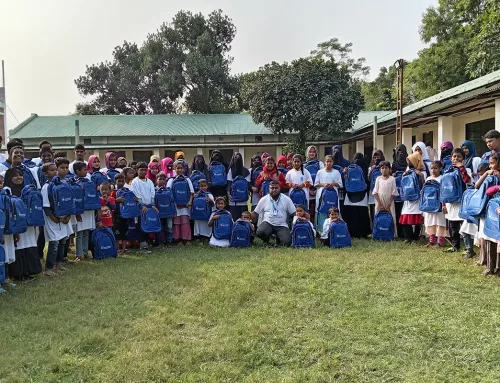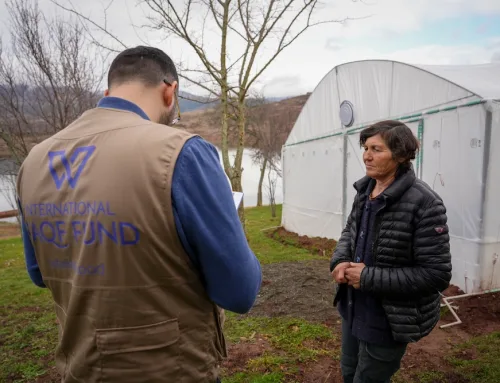The world can be unpredictable and disasters can quickly break down communities. Earthquakes, flooding, and deadly diseases can devastate populations leaving them without access to basic needs like food, water, and medical supplies.
At International Waqf Fund, we work to help rebuild communities and give people the resources they need to not only survive, but thrive. At the International Waqf Fund, we have been using the returns from Waqf shares donated to us, to help rebuild communities in need through our disaster response and emergency relief projects.
We have allocated £30,000 from the return on investments, from your generous Waqf shares to support our brothers and sisters in Turkey and Syria with food, medical supplies and water.
In past projects, we have also used the returns from your Waqf shares help rebuild the lives of survivors after earthquakes, flooding deadly diseases and more, such as the 2018 earthquake in Lombok.
Helping countries in times of disasters is of paramount importance for several reasons:
- Humanitarian Imperative: Providing assistance to countries affected by disasters is a moral imperative rooted in the principle of humanity. Disasters often result in immense human suffering, including loss of life, injuries, displacement, and psychological trauma. Offering aid demonstrates compassion, solidarity, and a commitment to alleviating human suffering and protecting the most vulnerable populations.
- Saving Lives and Mitigating Suffering: Timely assistance can save lives and alleviate suffering by providing essential supplies, medical care, shelter, food, and clean water to those in need. Immediate humanitarian aid is critical in the aftermath of disasters to address urgent needs and prevent further loss of life and harm.
- Upholding Human Rights: Access to assistance and protection is a fundamental human right, enshrined in international humanitarian law and human rights instruments. Providing aid to countries in times of disasters helps uphold the rights of affected populations, including the right to life, health, shelter, and access to basic necessities.
- Preventing Further Destabilization: Disasters can exacerbate existing vulnerabilities, deepen poverty, and contribute to social and political instability. By providing timely assistance and support for recovery and reconstruction efforts, the international community can help prevent further destabilization and mitigate the long-term impacts of disasters on communities and countries.
- Building Resilience and Preparedness: Supporting countries in disaster response, recovery, and preparedness efforts helps build resilience and strengthen their capacity to cope with future disasters. By investing in disaster risk reduction, early warning systems, infrastructure development, and community-based disaster preparedness initiatives, countries can better withstand and recover from future shocks and hazards.
- Global Solidarity and Cooperation: Disasters transcend national borders and require coordinated, global responses. Providing assistance to countries in times of disasters fosters solidarity, cooperation, and partnerships among nations, international organizations, civil society, and the private sector. It underscores the importance of collective action and shared responsibility in addressing common challenges and promoting global peace and security.
Supporting the Lombok earthquake survivors in 2018
The island of Lombok was hit by earthquakes, killing at least 259 people, hospitalising over 1,000 more and internally displacing a further 417,529 people. Thousands of houses and buildings were damaged or completely destroyed. The immediate needs of survivors, especially women, children and elderly, were food, drinking water, shelter, hygiene kits, mosquito nets, sanitation facilities and protection.
With the returns of Waqf shares, we were able to use the funds to provide immediate life-saving assistance in form of food, non-food, hygiene kits, and households equipment for 362 households.
“I was stunned when the shock hit the house that we slept in, I could feel the land shake and open up, I immediately got out from my bed. In my current condition, I can’t see my surroundings and couldn’t follow the others to safety, so I felt the wall beside me with my hand for direction and then quickened my steps to the door. In the end, I successfully escaped to the yard.
I could clearly hear the sound of people calling for help and noisy car horns and clamorous motorcycle engines everywhere. Then I started to think about my mother at home, I was so confused and prayed for mother’s safety.
A few moments later the village chiefs followed by village residents and officers start to directing us to the evacuation point located on the nearby ground. I and my friends followed their directions to the evacuation point, I keep gripping my friend’s hand tight, afraid of separation because the aftershocks still coming. When we arrived at the evacuation point I heard many people were already gathered there and I got news from the officer that my mother was safe and ask me to come home.” – Junaid
We can’t predict when natural disasters will hit, but we can be prepared to help with necessities such as food, water, hygiene kits and medical assistance when they do.
When you donate a Waqf share, we invest your donation and use the returns to help in times of emergency.
Give an Emergency Relief Waqf share.





